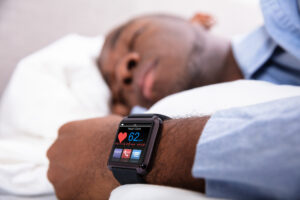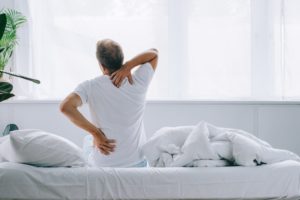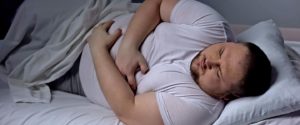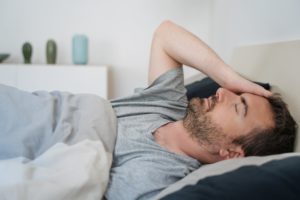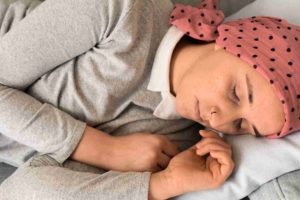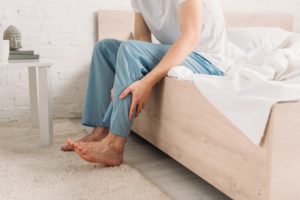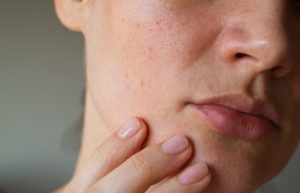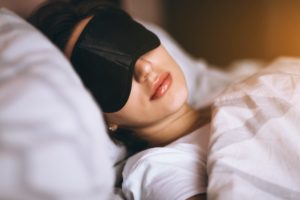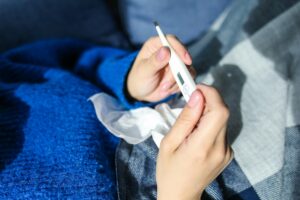When you buy through our links, we may earn a commission. Products or services may be offered by an affiliated entity. Learn more.
Lack of Sleep and Diabetes
Diabetes affects more than 30 million people in the U.S. and is the seventh leading cause of death. The most common form of diabetes, type 2 diabetes, is a chronic disease that develops due to insulin resistance.
Insulin is a hormone that helps transfer glucose from the blood to the muscles, fat, and liver, and other cells, where it can be used for energy. Insulin resistance occurs when the body has trouble producing insulin, or when the insulin fails to transfer glucose into these cells. This leads to a build-up of glucose in the blood, otherwise known as high blood sugar, which is the hallmark symptom of diabetes. If not properly managed, this can have severe consequences for the heart, kidneys, and other organs.
Diabetes and sleep are intricately connected, and many people with type 2 diabetes experience poor sleep quality or insomnia. The good news is that careful attention to diet, exercise, and blood sugar levels can make a world of difference to sleep quality and, in turn, to overall health.
Looking to improve your sleep? Try upgrading your mattress.
How Does Diabetes Affect Sleep?
It’s estimated that one in two people with type 2 diabetes have sleep problems due to unstable blood sugar levels and accompanying diabetes-related symptoms, High blood sugar (hyperglycemia) and low blood sugar (hypoglycemia) during the night can lead to insomnia and next-day fatigue. As with many chronic conditions, feelings of depression or stress about the disease itself may also keep you awake at night.
When blood sugar levels are high, the kidneys overcompensate by causing you to urinate more often. During the night, these frequent trips to the bathroom lead to disrupted sleep. High blood sugar may also cause headaches, increased thirst, and tiredness that can interfere with falling asleep.
By contrast, going too many hours without eating or taking the wrong balance of diabetes medication can also lead to low blood sugar levels at night. You may have nightmares, break out into a sweat, or feel irritated or confused when you wake up.
Talk to your healthcare provider if you are experiencing fatigue, trouble sleeping, or any other worrying symptoms. They can help analyze the reason and work with you to keep your blood sugar levels more stable.
How Does Poor Sleep Affect Blood Sugar Levels?
Just as diabetes can cause sleep problems, sleep problems also appear to play a role in diabetes. Getting poor sleep or less restorative slow-wave sleep has been linked to high blood sugar levels in people with diabetes and prediabetes. However, it’s not entirely clear whether one causes the other or whether more variables are at work. Researchers believe that sleep restriction may affect blood sugar levels due to its effects on insulin, cortisol, and oxidative stress.
One-quarter of people with diabetes report sleeping less than six hours or more than eight hours a night, which puts them at a higher risk of having elevated blood sugar. In addition to raising blood sugar levels in people who already have diabetes, sleep deprivation also raises the risk of developing insulin resistance in the first place. This link becomes apparent as early as childhood.
Studies have also found that later or irregular sleeping schedules are correlated with higher blood sugar, even in non-diabetic people. However, there may be other variables that explain this, such as the fact that people with irregular sleeping schedules are more likely to follow an erratic diet.
Sleep deprivation raises levels of ghrelin, the hunger hormone, and decreases levels of leptin, the hormone that makes us feel full. To compensate for lower energy levels, people who sleep poorly may be more likely to seek relief in foods that raise blood sugar and put them at risk of obesity, which is a risk factor for diabetes.
Adults with type 2 diabetes who experience disturbed sleep or frequent nighttime awakenings may also be less likely to follow other standards for diabetes self-care, such as getting enough exercise and closely monitoring blood glucose levels.
In addition to its immediate effects on blood sugar levels, poor sleep can take a long-term toll on individuals with type 2 diabetes. Those who resort to sleep medication or who have trouble staying asleep are more likely to report feeling serious psychological distress. There is also tentative evidence to suggest that people with diabetes who do not get enough sleep may be at a higher risk for cognitive decline later in life.
Common Sleep Disorders in People With Diabetes
Individuals with type 2 diabetes have a higher chance of developing accompanying sleep disorders, the most common being restless legs syndrome and obstructive sleep apnea.
- Restless Legs Syndrome (RLS): Approximately one in five people with type 2 diabetes have restless legs syndrome, marked by tingling or other irritating sensations in the legs that can interfere with getting to sleep. People with diabetes are also at risk for another condition called peripheral neuropathy. Caused by nerve damage, the symptoms of peripheral neuropathy are very similar to RLS and include numbness, tingling, and pain in the extremities. People who experience these symptoms should consult a healthcare provider, as peripheral neuropathy requires treatment to reduce long-term nerve damage.
- Obstructive Sleep Apnea (OSA): Obstructive sleep apnea is a sleep disorder in which a person momentarily stops breathing at recurring intervals throughout the night. In most cases, the person is not aware this is happening, though a bed partner may observe snoring and gasping. These lapses in breathing cause micro-arousals (very brief awakenings) that interfere with the natural progression of the sleep stages and impair sleep quality. OSA typically occurs in people who are overweight or obese, as they often have a thicker neck circumference that interferes with the airway. The condition can be treated with a continuous positive airway pressure (CPAP) device that keeps the airway open to restore normal breathing and reduce interruptions to sleep.
The Connection Between Sleep Apnea and Diabetes
Though sleep apnea does not directly cause diabetes, it is a risk factor for type 2 diabetes and has been shown to increase insulin resistance, even in non-diabetic and non-overweight people. The American Diabetes Association estimates that up to one in four people with type 2 diabetes also suffers from OSA, and a further quarter of type 2 diabetics suffer from another sleep-related breathing disorder.
Both OSA and type 2 diabetes are more common in people who are overweight and obese. However, OSA appears to affect insulin resistance and glucose control even after controlling for obesity. Not only does OSA cause sleep fragmentation that interferes with slow-wave sleep, but it also periodically cuts off the body’s oxygen supply. Together, these effects lead to insulin resistance and impaired glucose metabolism.
In many studies, short-term sleep apnea treatment appears to improve blood sugar levels, while long-term CPAP treatment improves blood sugar and insulin resistance. However, other studies have failed to find improvements in blood glucose levels after treating OSA, leading some researchers to believe the connection could be due to other variables such as weight.
More research is needed to further characterize the nature of the connection, but it is clear that physical health plays an important role in sleep apnea and diabetes. A combination of weight loss and CPAP treatment may be the most effective way to treat sleep apnea in people with type 2 diabetes.
How Can People With Diabetes Cope With Sleep Issues?
Careful management of blood sugar levels can help improve sleep for people with type 2 diabetes. Additionally, given the close relationship between diabetes and sleep, good sleep hygiene habits are particularly important. These include both daytime and nighttime habits, such as:
- Adhering to a diet plan that works for you and helps keep blood sugar controlled
- Getting regular exercise
- Keeping a regular sleep schedule
- Avoiding stimulants like caffeine or nicotine before bed
- Keeping the bedroom cool, dark, and quiet
Based on your personal situation, your doctor may be able to recommend sleep aids for diabetics or additional ways to get better sleep. They may choose to conduct a polysomnogram, or sleep study, to see if a sleep disorder is to blame for your sleep problems. Secondary sleep disorders can then be treated with targeted therapies such as a CPAP machine.

Still have questions? Ask our community!
Join our Sleep Care Community — a trusted hub of sleep health professionals, product specialists, and people just like you. Whether you need expert sleep advice for your insomnia or you’re searching for the perfect mattress, we’ve got you covered. Get personalized guidance from the experts who know sleep best.
References
17 Sources
-
Huang, Y. C., Zuñiga, J. A., & García, A. A. (2019). Association between sleep and serious psychological distress in patients with diabetes. Psychology, health & medicine, 24(8), 925–935.
https://www.tandfonline.com/doi/full/10.1080/13548506.2019.1612075 -
Zhu, B., Quinn, L., Kapella, M. C., Bronas, U. G., Collins, E. G., Ruggiero, L., Park, C. G., & Fritschi, C. (2018). Relationship between sleep disturbance and self-care in adults with type 2 diabetes. Acta diabetologica, 55(9), 963–970.
https://pubmed.ncbi.nlm.nih.gov/29931420/ -
Low Blood Glucose (Hypoglycemia). (2016, August). National Institute of Diabetes and Digestive and Kidney Diseases. Accessed on November 19, 2020, from
https://www.niddk.nih.gov/health-information/diabetes/overview/preventing-problems/low-blood-glucose-hypoglycemia -
Yoda, K., Inaba, M., Hamamoto, K., Yoda, M., Tsuda, A., Mori, K., Imanishi, Y., Emoto, M., & Yamada, S. (2015). Association between poor glycemic control, impaired sleep quality, and increased arterial thickening in type 2 diabetic patients. PloS one, 10(4), e0122521.
https://pubmed.ncbi.nlm.nih.gov/25875738/ -
Iyegha, I. D., Chieh, A. Y., Bryant, B. M., & Li, L. (2019). Associations between poor sleep and glucose intolerance in prediabetes. Psychoneuroendocrinology, 110, 104444.
https://pubmed.ncbi.nlm.nih.gov/31546116/ -
Rains, J. L., & Jain, S. K. (2011). Oxidative stress, insulin signaling, and diabetes. Free radical biology & medicine, 50(5), 567–575.
https://pubmed.ncbi.nlm.nih.gov/21163346/ -
Brouwer, A., van Raalte, D. H., Rutters, F., Elders, P., Snoek, F. J., Beekman, A., & Bremmer, M. A. (2020). Sleep and HbA1c in Patients With Type 2 Diabetes: Which Sleep Characteristics Matter Most?. Diabetes care, 43(1), 235–243.
https://diabetesjournals.org/care/article/43/1/235/35916/Sleep-and-HbA1c-in-Patients-With-Type-2-Diabetes -
Dutil, C., & Chaput, J. P. (2017). Inadequate sleep as a contributor to type 2 diabetes in children and adolescents. Nutrition & diabetes, 7(5), e266.
https://pubmed.ncbi.nlm.nih.gov/28481337/ -
Leproult, R., Holmbäck, U., & Van Cauter, E. (2014). Circadian misalignment augments markers of insulin resistance and inflammation, independently of sleep loss. Diabetes, 63(6), 1860–1869.
https://pubmed.ncbi.nlm.nih.gov/24458353/ -
Holingue, C., Wennberg, A., Berger, S., Polotsky, V. Y., & Spira, A. P. (2018). Disturbed sleep and diabetes: A potential nexus of dementia risk. Metabolism: clinical and experimental, 84, 85–93.
https://pubmed.ncbi.nlm.nih.gov/29409842/ -
American Diabetes Association (2020). 4. Comprehensive Medical Evaluation and Assessment of Comorbidities: Standards of Medical Care in Diabetes-2020. Diabetes care, 43(Suppl 1), S37–S47.
https://diabetesjournals.org/care/article/43/Supplement_1/S37/30855/4-Comprehensive-Medical-Evaluation-and-Assessment -
Punjabi, N. M., Shahar, E., Redline, S., Gottlieb, D. J., Givelber, R., Resnick, H. E., & Sleep Heart Health Study Investigators (2004). Sleep-disordered breathing, glucose intolerance, and insulin resistance: the Sleep Heart Health Study. American journal of epidemiology, 160(6), 521–530.
https://academic.oup.com/aje/article-lookup/doi/10.1093/aje/kwh261 -
Nedeltcheva, A. V., & Scheer, F. A. (2014). Metabolic effects of sleep disruption, links to obesity and diabetes. Current opinion in endocrinology, diabetes, and obesity, 21(4), 293–298.
https://pubmed.ncbi.nlm.nih.gov/24937041/ -
Mokhlesi, B., Grimaldi, D., Beccuti, G., & Van Cauter, E. (2017). Effect of one week of CPAP treatment of obstructive sleep apnoea on 24-hour profiles of glucose, insulin and counter-regulatory hormones in type 2 diabetes. Diabetes, obesity & metabolism, 19(3), 452–456.
https://onlinelibrary.wiley.com/doi/10.1111/dom.12823 -
Martínez-Cerón, E., Barquiel, B., Bezos, A. M., Casitas, R., Galera, R., García-Benito, C., Hernanz, A., Alonso-Fernández, A., & Garcia-Rio, F. (2016). Effect of Continuous Positive Airway Pressure on Glycemic Control in Patients with Obstructive Sleep Apnea and Type 2 Diabetes. A Randomized Clinical Trial. American journal of respiratory and critical care medicine, 194(4), 476–485.
https://www.atsjournals.org/doi/10.1164/rccm.201510-1942OC -
Shaw, J. E., Punjabi, N. M., Naughton, M. T., Willes, L., Bergenstal, R. M., Cistulli, P. A., Fulcher, G. R., Richards, G. N., & Zimmet, P. Z. (2016). The Effect of Treatment of Obstructive Sleep Apnea on Glycemic Control in Type 2 Diabetes. American journal of respiratory and critical care medicine, 194(4), 486–492.
https://www.atsjournals.org/doi/10.1164/rccm.201511-2260OC -
Shechter, A., Foster, G. D., Lang, W., Reboussin, D. M., St-Onge, M. P., Zammit, G., Newman, A. B., Millman, R. P., Wadden, T. A., Jakicic, J. M., Strotmeyer, E. S., Wing, R. R., Pi-Sunyer, F. X., Kuna, S. T., & Sleep Ahead Research Group of the Look Ahead Research Group (2017). Effects of a lifestyle intervention on REM sleep-related OSA severity in obese individuals with type 2 diabetes. Journal of sleep research, 26(6), 747–755.
https://pubmed.ncbi.nlm.nih.gov/28560832/






